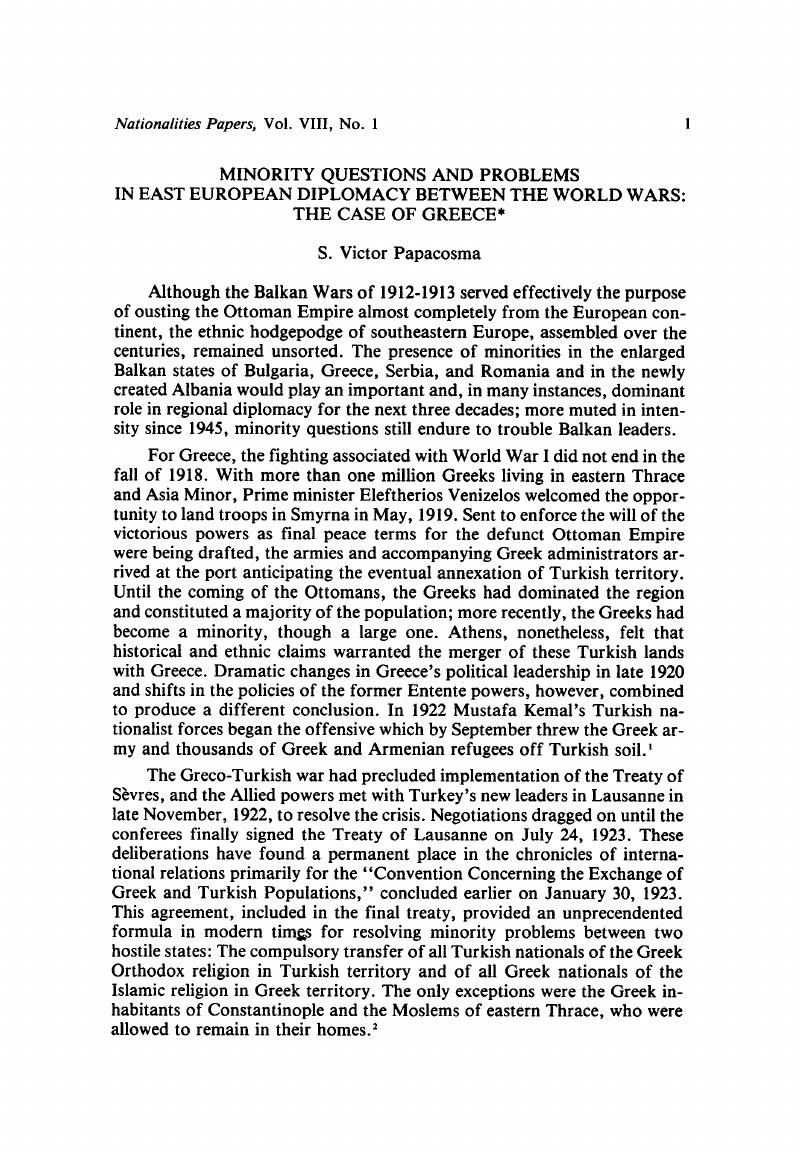No CrossRef data available.
Article contents
Minority Questions and Problems in East European Diplomacy Between the World Wars: The Case of Greece*
Published online by Cambridge University Press: 20 November 2018
Abstract

- Type
- Articles
- Information
- Copyright
- Copyright © 1980 Association for the Study of Nationalities of Eastern Europe
References
Notes
* This paper was prepared for the 1978 AAASS National convention in Columbus, Ohio.Google Scholar
1. On Greece's presence in Asia Minor refer to Pallis, A.A., Greece's Anatolian Venture—and After (London, 1937); and Smith, Michael L., Ionian Vision; Greece in Asia Minor, 1919-1922 (London, 1973).Google Scholar
2. For a thorough analysis of the Lausanne Conference and Greek positions see Yanoulopoulos, Y., “The Conference of Lausanne, 1922-1923,” , University of London, 1974.Google Scholar
3. A provocative analysis of these crucial decisions is found in Petropulos, John A., “The Compulsory Exchange of Populations: Greek-Turkish Peacemaking, 1922-1930,” Byzantine and Modern Greek Studies, 2 (1976): 135-60.CrossRefGoogle Scholar
4. Pentzopoulos, Dimitri, The Balkan Exchange of Minorities and Its Impact upon Greece (Paris, 1962), pp. 54–55.Google Scholar
5. Translated from the French and quoted in Pentzopoulos, Balkan Exchange, p. 56.Google Scholar
6. Pentzopoulos, , Balkan Exchange, pp. 60–61; for heavy detail on the Greco-Bulgarian exchange and subsequent problems refer to Ladas, Stephen P., The Exchange of Minorities—Bulgaria, Greece and Turkey (New York, 1932), pp. 27–331.Google Scholar
7. For extensive information on the Greco-Turkish exchange and its aftermath consult Ladas, Exchange of Minorities, pp. 335–588.Google Scholar
8. For a standard Greek nationalist interpretation of interware Greek foreign policy issues refer to Pipinelis, P., [Hestoria tes exoterikes politikes tes Hellados, 1923-1941] A History of Greece's Foreign Policy, 1923-1941 (Athens, 1948).Google Scholar
9. Barker, Elisabeth, Macedonia: Its Place in Balkan Power Politics (London, 1950), pp. 10–11.Google Scholar
10. Barker, , Macedonia, p. 32; Pentzopoulos, Balkan Exchange, pp. 127-37. Also, certain smaller groups, such as the Pomaks and Vlachs, are not specifically cited.Google Scholar
11. Markezinis, S.B., Politike hestoria tes neoteras Hellados. Seira B: Synchronos Hellados—A' Hellenike Demokratia (1924-1935) [A Political History of Modern Greece. Series 2: Contemporary Greece—The First Greek Republic (1924-1935)] (Athens, 1978), pp. 39-44; Gregory Daphnis, He Hellas metaxy duo polemon, 1923-1940 [Greece between Two Wars, 1923-1940] (Athens, 1955), I: 263-265; P. Argyropoulos, Apomnemonevmata [Memoirs] (Athens, 1970), pp. 353-55; Barker, Macedonia, pp. 11, 31.Google Scholar
12. This interesting interlude is skillfully analyzed by Barros, James, The League of Nations and the Great Powers: The Greek-Bulgarian Incident, 1925 (Oxford, 1970).Google Scholar
13. Kofos, Evangelos, Nationalism and Communism in Macedonia (Thessalonike, 1964), pp. 66–94; Barker, Macedonia, pp. 45-77.Google Scholar
14. Stavrianos, L.S., The Balkans since 1453 (New York, 1958), p. 712.Google Scholar
15. The intricate details are related in Barros, James, The Corfu Incident of 1923: Mussolini and the League of Nations (Princeton, 1965).Google Scholar
16. Loraine to Chamberlain, 1 March 1929, British Foreign Office 371/13659, No. 87, “Greece. Annual Report, 1928,” pp. 2-3; Harry J. Psomiades, “The Diplomacy of Eleftherios Venizelos, 1928-1930,” Essays in Memory of Basil Laourdas (Thessalonike, 1975), p. 558; for details on the first months of Venizelos' prime ministership consult C. D. Svolopoulos, He Hellenike exoterike politike meta ten syntheken tes Lozannes: He krisimos kampe (Ioulios-Dekemvrios 1928) [Greek Foreign Policy after the Treaty of Lausanne: The Critical Turn (July-December 1928)] Thessalonike, 1977).Google Scholar
17. Psomiades, Harry J., The Eastern Question: The Last Phase—A Study in Greek-Turkish Diplomacy (Thessalonike, 1968), pp. 81–83; Psomiades, “Diplomacy of Eleftherios Venizelos,” pp. 563-67; Daphnis, Hellas, 2: 62-70.Google Scholar
18. Psomiades, , “Diplomacy of Eleftherios Venizelos,” pp. 558-62; Barker, Macedonia, pp. 34-36; Daphnis, Hellas, 2: 57–62, 70-71.Google Scholar
19. Lascaris, S. Th., Diplomatike hestoria tes synchrones Evropes (1914-1939) [A Diplomatic History of Contemporary Europe (1914-1939)] (Thessalonike, 1954), pp. 281-93; Couloumbis, T.A., Petropulos, J.A., and Psomiades, H.J., Foreign Interference in Greek Politics: An Historical Perspective (New York, 1976), pp. 92–93: Stavrianos, Balkans, pp. 738-45.Google Scholar


